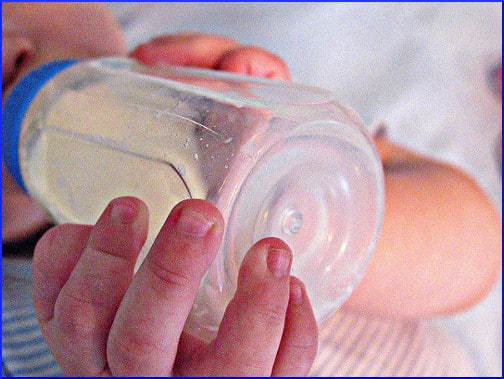
What is the relationship between childhood obesity and the use of pacifiers? First, what about health in general?
According to Nicole Caccavo Kear, “When examined under a microscope, used pacifiers were found to have fungi plus bacteria similar to E. coli on and within the nipple.” That sentence is disturbing, but not in the way the writer intended. If science is anything, it is precise, and it seems like a bacterium can competently be identified as either E. coli, or not E. coli.
Soap-and-water wash the pacifier frequently, or even run it through the dishwasher, experts recommend — except for those who don’t. Scientists at the University of Gothenburg developed a theory that allergies might be prevented if babies were exposed to more, not less, organic debris.
They zeroed in on a population of 184 newborns, whose parents had different germ-avoidance protocols regarding pacifiers that fall on the floor or otherwise get loose in the world. At one end of the spectrum were the boilers. The vast middle ground were tap-water rinsers.
Then, there were the parents who resolved any dropped-pacifier dilemma by cleaning it off in their own mouth. When the babies reached the age of six months, everything was tallied up.
In the bigger picture, the researchers found no difference in the allergy rate, between pacifier kids and non-pacifier kids. Also, boiling does not affect allergy development. This was the big news:
It was found that children whose parents habitually sucked the pacifier were three times less likely to suffer from eczema at 1.5 years of age, as compared with the children of parents who did not do this. When controlled for other factors that could affect the risk of developing allergy […] the beneficial effect of parental sucking on the pacifier remained. No more upper respiratory infections were seen in the children whose parents sucked on their dummies, as compared with the other children…
Of course the microbes in everybody’s mouths were scrutinized, and it looks like the transfer of oral commensal microbes from parent to baby was the cause of this effect. Any such discovery is a long way from having any practical application, because it is “difficult to pinpoint which bacteria a baby should be exposed to, and at what time and by which route this exposure should ideally occur.”
But what about obesity?
Non-nutritive sucking is a natural reflex and a satisfying and fulfilling activity in its own right. A child’s thumb is the original no-calorie snack, and a pacifier serves the same function, so why not welcome it as part of a baby’s routine?
Since sucking alone is an activity that babies like to engage in, even when no actual food is involved, do they tend to overfeed on formula or even on breast milk, just because they like to suck? The research team said:
Our goal was to determine whether pacifier use in early infancy is associated with lower incidence of obesity at later age.
This study, reported in Clinical Pediatrics, observed almost 400 infants, of whom approximately half used pacifiers and half did not. Conclusions?
Pacifier use in infancy was associated with lower incidence of obesity at 9 to 15 months of age. Offering a pacifier can be protective against infantile obesity.
Your responses and feedback are welcome!
Source: “5 Binky Basics: What You Need to Know About Pacifiers,” Parents.com, undated
Source: “Parents who suck on their infants’ pacifiers may protect their children against developing allergy,” ScienceDaily.com, 05/07/13
Source: “Does Pacifier Use in Infancy Decrease the Risk of Obesity?,” ResearchGate.net, March 2017
Photo credit: nerissa’s ring on Visualhunt/CC BY

 FAQs and Media Requests:
FAQs and Media Requests: 











